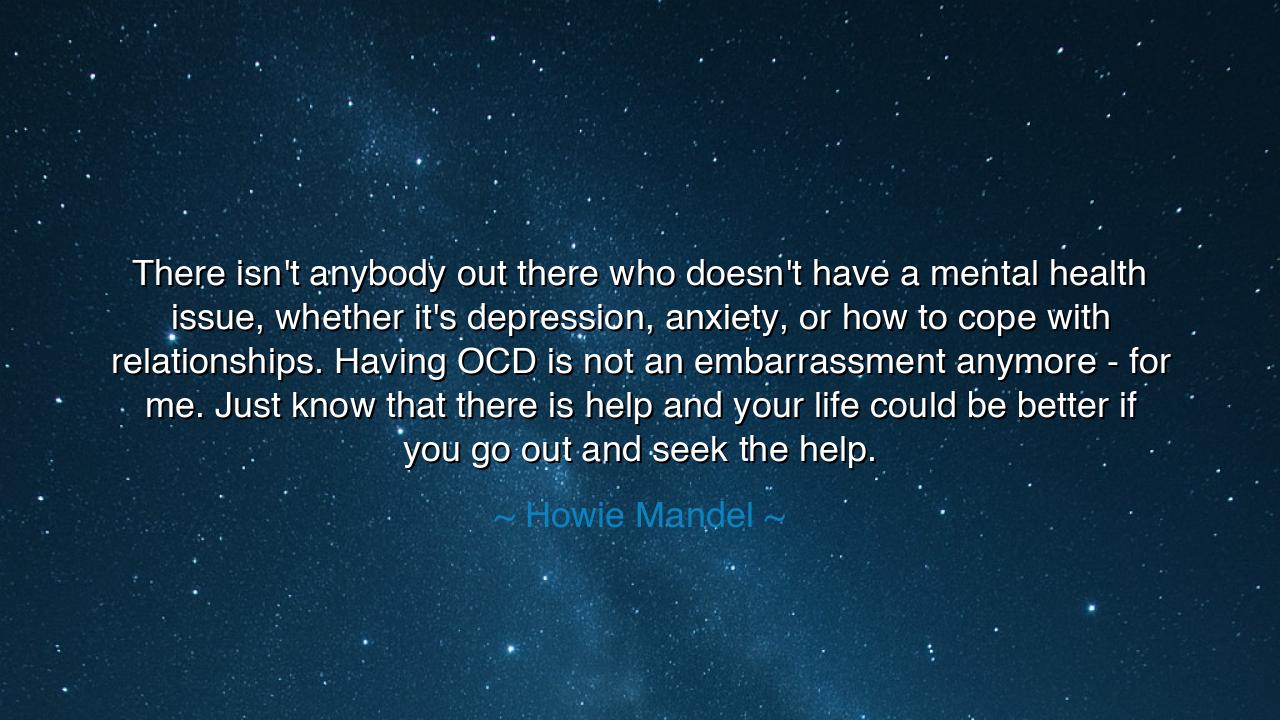
There isn't anybody out there who doesn't have a mental health
There isn't anybody out there who doesn't have a mental health issue, whether it's depression, anxiety, or how to cope with relationships. Having OCD is not an embarrassment anymore - for me. Just know that there is help and your life could be better if you go out and seek the help.






The words of Howie Mandel — “There isn't anybody out there who doesn't have a mental health issue, whether it's depression, anxiety, or how to cope with relationships. Having OCD is not an embarrassment anymore — for me. Just know that there is help and your life could be better if you go out and seek the help.” — carry the resonance of confession transformed into courage. They are the words of a man who has walked through the labyrinth of his own mind and emerged not unscarred, but unashamed. Beneath their gentle tone lies a message both timeless and urgent: that to be human is to struggle, and that healing begins the moment we stop hiding from our pain.
In the wisdom of the ancients, those who tended to the spirit were regarded with the same reverence as those who healed the body. The Greeks spoke of melancholia and mania, not as weaknesses, but as conditions of the soul requiring understanding. The philosophers knew that the mind, like the heart, could break — and that strength was found not in denial, but in recognition. What Mandel reminds us of, in our modern age of noise and distraction, is an ancient truth forgotten: that mental health is not the concern of the few, but the condition of all. Every person carries unseen battles — doubts, fears, anxieties — and in acknowledging this, we find the first light of empathy.
The origin of Mandel’s insight is deeply personal. For much of his life, he struggled with Obsessive-Compulsive Disorder (OCD) and anxiety — a silent tormentor that dictated his thoughts and actions. In a world that often mocks or misunderstands such struggles, he chose not to conceal his affliction, but to reveal it. In doing so, he broke a wall of stigma that imprisons millions. His courage lies not in having conquered his illness, but in living openly with it — in showing that acceptance is not surrender, but liberation. His story is a reminder that vulnerability can become a form of leadership, and honesty a kind of healing that extends beyond oneself.
History offers its mirrors. The composer Ludwig van Beethoven, tormented by deafness and despair, once wrote, “Only art kept me from ending my life.” His music became his therapy — the vessel through which he translated his anguish into something eternal. So too did the poet Sylvia Plath write of her inner storms, not to glorify suffering, but to give it voice. Through them, as through Mandel, we learn that when the wounded speak their truth, they offer medicine to the world. To name one’s pain is to strip it of its dominion.
Mandel’s declaration that “having OCD is not an embarrassment anymore” is a triumph over centuries of silence. For too long, society has hidden mental illness behind walls of shame and misunderstanding. The ancients built temples for healing; we built stereotypes and fear. Yet now, a transformation begins — a return to compassion. To speak of mental health with openness is to reclaim dignity. It is to affirm that the mind’s wounds deserve the same care as those of the flesh, and that asking for help is not weakness, but wisdom.
The deeper message within his words is a call to action: seek help, for help exists. It is a reminder that healing does not come to the silent. Just as no ship reaches harbor without setting sail, no soul finds peace without reaching out. In a world that often glorifies independence, Mandel’s message restores balance — for even the strongest hearts need others to steady them. The healer’s hand may come as a therapist, a friend, a community — but it begins with a single act of courage: the decision to speak.
So, my children, learn from this teaching: do not be ashamed of your humanity. Your mind, in all its complexity, is both gift and mystery. When it falters, tend to it with patience; when it aches, let others help you bear it. For there is no strength in silence, and no honor in isolation. The bravest act a person can perform is not to hide their pain, but to face it with honesty and hope.
And thus, Howie Mandel’s words will live as both comfort and commandment: that we are all travelers through the terrain of the mind, and that healing begins when we walk together. In speaking his truth, he reminds us that every heart — however troubled — can find its balance again. Let us, then, be kind to ourselves and to others, for behind every smile may lie a storm. And in that shared understanding, we may yet build a world where no one suffers in silence, and where compassion becomes the greatest medicine of all.






AAdministratorAdministrator
Welcome, honored guests. Please leave a comment, we will respond soon